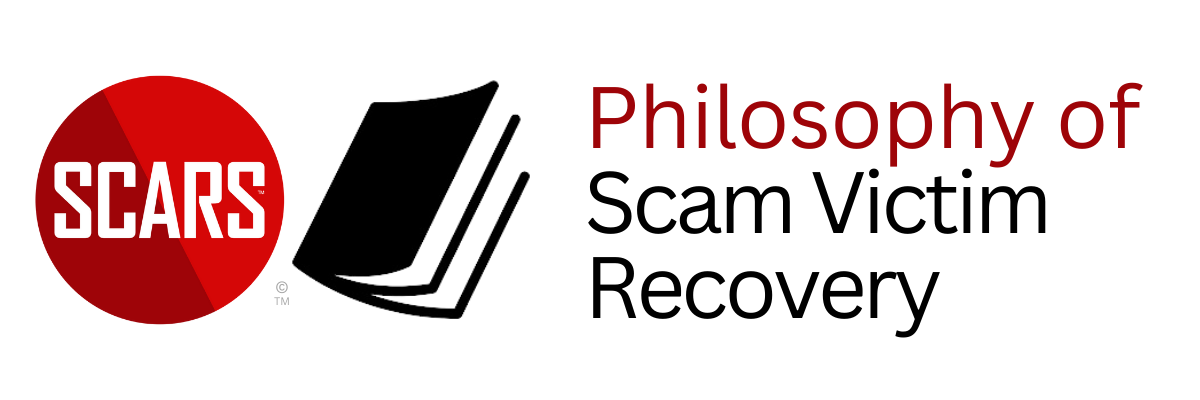Scam Victims’ Pain and Suffering – Sailing the 8 Worldly Winds
A Guide for Scam Victims to Sail the 8 Worldly Winds: Through Pain and Suffering, Trauma and Grief, and Recovery
Primary Category: Philosophy of Scam Victim Recovery
Author:
• Tim McGuinness, Ph.D., DFin, MCPO, MAnth – Anthropologist, Scientist, Polymath, Director of the Society of Citizens Against Relationship Scams Inc.
About This Article
Viewing life through the lens of the 8 Worldly Winds—gain and loss, pleasure and pain, praise and blame, fame and disrepute—helps individuals, particularly scam victims, navigate emotional turmoil by recognizing the transient nature of experiences.
By understanding that both positive and negative events are impermanent, victims can cultivate emotional resilience, detach from extremes, and find peace. This perspective encourages mindful acceptance of life’s fluctuations, promoting healing and personal growth.
Scam victims can use this framework to manage suffering, regain self-worth, and rebuild their emotional balance.

A Guide for Scam Victims to Sail the 8 Worldly Winds: Through Pain and Suffering, Trauma and Grief, and Recovery
The Buddhist teaching of “the 8 Worldly Winds” addresses the inevitable ups and downs of life, including gain and loss, praise and blame, and joy and suffering. It emphasizes that while pain is inevitable, suffering is a choice shaped by our attachment and response to life’s fluctuations. This wisdom becomes particularly relevant when applied to scam victims, who often face profound emotional trauma, grief, and psychological suffering after being deceived.
“Pain is inevitable, but suffering is optional.” — Buddha
What are the 8 Worldly Winds
The “8 Worldly Winds” in Buddhism represent the ever-shifting external forces that influence our emotional and mental states.
“The mind is everything. What you think you become.” — Buddha
These eight are:
- gain and
- loss,
- pleasure and
- pain,
- praise and
- blame, and
- fame and
- disrepute
“Every experience, no matter how bad it seems, holds within it a blessing of some kind. The goal is to find it.” — Buddha
Seeing life through the lens of the 8 Worldly Winds helps individuals recognize the transient nature of these experiences. By accepting that life is subject to these changing forces, we learn to detach from the extremes of joy and suffering, cultivating inner peace regardless of external circumstances. This view is crucial in emotional healing, especially for scam victims.
“Do not dwell in the past, do not dream of the future, concentrate the mind on the present moment.” — Buddha
By aligning with the understanding that life is a constant flux of gains and losses, praise and criticism, and comfort and discomfort, scam victims can start letting go of harmful attachments. They can cultivate resilience and emotional equilibrium, seeing each “wind” as an opportunity for personal growth rather than a fixed label of failure or success.
“No one saves us but ourselves. No one can and no one may. We ourselves must walk the path.” — Buddha
Scam Victims
Scam victims, particularly those who have been manipulated in romance or financial fraud, often experience intense feelings of betrayal, loss, and emotional devastation. These situations mirror the “worldly winds” discussed in Buddhism, as victims face sudden losses, shame, guilt, and the collapse of relationships or finances they once relied on. The emotional pain that follows is very real, but the degree of suffering can be shaped by how the victims process these experiences.
“The root of suffering is attachment.” — Buddha
Trauma and grief compound the suffering scam victims experience. Psychological trauma may cause them to relive the events repeatedly, creating a cycle of suffering where they constantly re-experience the betrayal, guilt, and loss. Grieving over what they lost—whether trust, money, or a sense of security—deepens the emotional pain. Scam victims often feel powerless, further intensifying their suffering.
“Holding on to anger is like grasping a hot coal with the intent of throwing it at someone else; you are the one who gets burned.” — Buddha
The Principle that Suffering is Optional
Yet, the Buddhist principle that suffering is optional encourages victims to reflect on how they respond to these “worldly winds.” While they cannot undo the scam or the pain it caused, they can focus on how they process and interpret the aftermath. By learning to observe their emotions with mindfulness—without allowing them to take control—victims can begin to manage their reactions more effectively.
“You only lose what you cling to.” — Buddha
For victims who have been through psychological trauma, healing often begins with acceptance. Like the Buddhist principle of non-attachment, acceptance means acknowledging the situation, its reality, and its impermanence. It allows individuals to let go of self-blame, anger, and fear, and to understand that these emotions, while painful, don’t have to define their future.
“The way is not in the sky. The way is in the heart.” — Buddha
The Lens of the Worldly Winds
Through this lens, scam victims can begin to see the situation not just as a cause of suffering, but as an opportunity for personal growth. Mindfulness practices, such as meditation or focusing on the present moment, can help victims process their grief without being consumed by it. Self-compassion is also vital, encouraging victims to be kind to themselves rather than harshly blaming themselves for falling prey to a scam.
“Your work is to discover your world and then with all your heart give yourself to it.” — Buddha
Set Sail on the 8 Worldy Winds
Here is a step-by-step guide to help scam victims ‘Sail the 8 Worldly Winds’ and navigate through pain and suffering:
Acknowledge the Reality
Recognize the scam and its impact. Denying the situation prolongs suffering. Acceptance is the first step in healing.
“There is no fear for one whose mind is not filled with desires.” — Buddha
Practice Mindfulness
Stay grounded in the present moment. Do not focus on the past or the future, just the present. Focus on breathing or engage in meditation to calm the mind and reduce fixation on past events.
“Just as a snake sheds its skin, we must shed our past over and over again.” — Buddha
Let Go of Attachment
Detach from the need to understand “why” the scam happened. Understand that life’s circumstances—like loss and gain—are unpredictable and impermanent. As the song says ‘Let it Go!’
“In the end, only three things matter: how much you loved, how gently you lived, and how gracefully you let go of things not meant for you.” — Buddha
Cultivate Self-Compassion
Be gentle with yourself. Acknowledge that anyone can become a victim of manipulation and that this doesn’t define your worth. Remember that: You are a Survivor, It WAS NOT Your Fault, You are Not Alone, Axios, Vero.
“To conquer oneself is a greater task than conquering others.” — Buddha
Reflect on Lessons Learned
Use the experience as an opportunity for learning and growth. What boundaries will you set moving forward? How can this hardship strengthen your resilience? Enroll in the SCARS Institute’s FREE Scam Survivor’s School at SCARSeducation.org
“The only real failure in life is not to be true to the best one knows.” — Buddha
Surround Yourself with Support
Engage with trusted family, friends, support and recovery providers, or mental health professionals. Victims should not navigate recovery alone—support networks are essential for healing.
“Thousands of candles can be lighted from a single candle. Happiness never decreases by being shared.” — Buddha
Release Control Over External Validation
The winds of praise and blame can shift unexpectedly. Focus on internal growth rather than seeking validation from others or society.
“Every morning we are born again. What we do today is what matters most.” — Buddha
Embrace the Impermanence of Suffering
Understand that suffering, like all things, will pass. Stay patient with your journey and remind yourself that healing takes time. While there will be much that you must learn, in learning, taking control, and time, you will master the suffering.
“Do not overlook tiny good actions, thinking they are of no benefit; even tiny drops of water in the end will fill a huge vessel.” — Buddha
By incorporating these steps into their daily practice, scam victims can begin to release the emotional pain and rebuild their sense of peace, security, and self-worth.
Conclusion
In essence, scam victims can learn to “sail” the worldly winds by recognizing that life will bring both pain and pleasure, but their inner response can be shaped through awareness, acceptance, and self-compassion. Though they may feel shattered by the experience, they have the power to rebuild their lives by choosing resilience over suffering, drawing on the wisdom of detachment, and finding peace within the storm.
“To understand everything is to forgive everything.” — Buddha
“The greatest techings come from suffering and the greatest teachers are often those who suffer most.” — Dr. Tim McGuinness
-/ 30 /-
What do you think about this?
Please share your thoughts in a comment below!
Statement About Victim Blaming
SCARS Institute articles examine different aspects of the scam victim experience, as well as those who may have been secondary victims. This work focuses on understanding victimization through the science of victimology, including common psychological and behavioral responses. The purpose is to help victims and survivors understand why these crimes occurred, reduce shame and self-blame, strengthen recovery programs and victim opportunities, and lower the risk of future victimization.
At times, these discussions may sound uncomfortable, overwhelming, or may be mistaken for blame. They are not. Scam victims are never blamed. Our goal is to explain the mechanisms of deception and the human responses that scammers exploit, and the processes that occur after the scam ends, so victims can better understand what happened to them and why it felt convincing at the time, and what the path looks like going forward.
Articles that address the psychology, neurology, physiology, and other characteristics of scams and the victim experience recognize that all people share cognitive and emotional traits that can be manipulated under the right conditions. These characteristics are not flaws. They are normal human functions that criminals deliberately exploit. Victims typically have little awareness of these mechanisms while a scam is unfolding and a very limited ability to control them. Awareness often comes only after the harm has occurred.
By explaining these processes, these articles help victims make sense of their experiences, understand common post-scam reactions, and identify ways to protect themselves moving forward. This knowledge supports recovery by replacing confusion and self-blame with clarity, context, and self-compassion.
Additional educational material on these topics is available at ScamPsychology.org – ScamsNOW.com and other SCARS Institute websites.
-/ 30 /-
What do you think about this?
Please share your thoughts in a comment below!
TABLE OF CONTENTS
- A Guide for Scam Victims to Sail the 8 Worldly Winds: Through Pain and Suffering, Trauma and Grief, and Recovery
- About This Article
- A Guide for Scam Victims to Sail the 8 Worldly Winds: Through Pain and Suffering, Trauma and Grief, and Recovery
- What are the 8 Worldly Winds
- Scam Victims
- The Principle that Suffering is Optional
- The Lens of the Worldly Winds
- Set Sail on the 8 Worldy Winds
- Conclusion
CATEGORIES
![NavyLogo@4x-81[1] Scam Victims Pain and Suffering - Sailing the 8 Worldly Winds - 2024](https://scamsnow.com/wp-content/uploads/2025/04/NavyLogo@4x-811.png)
ARTICLE META
Important Information for New Scam Victims
- Please visit www.ScamVictimsSupport.org – a SCARS Website for New Scam Victims & Sextortion Victims.
- SCARS Institute now offers its free, safe, and private Scam Survivor’s Support Community at www.SCARScommunity.org – this is not on a social media platform, it is our own safe & secure platform created by the SCARS Institute especially for scam victims & survivors.
- SCARS Institute now offers a free recovery learning program at www.SCARSeducation.org.
- Please visit www.ScamPsychology.org – to more fully understand the psychological concepts involved in scams and scam victim recovery.
If you are looking for local trauma counselors, please visit counseling.AgainstScams.org
If you need to speak with someone now, you can dial 988 or find phone numbers for crisis hotlines all around the world here: www.opencounseling.com/suicide-hotlines
Statement About Victim Blaming
Some of our articles discuss various aspects of victims. This is both about better understanding victims (the science of victimology) and their behaviors and psychology. This helps us to educate victims/survivors about why these crimes happened and not to blame themselves, better develop recovery programs, and help victims avoid scams in the future. At times, this may sound like blaming the victim, but it does not blame scam victims; we are simply explaining the hows and whys of the experience victims have.
These articles, about the Psychology of Scams or Victim Psychology – meaning that all humans have psychological or cognitive characteristics in common that can either be exploited or work against us – help us all to understand the unique challenges victims face before, during, and after scams, fraud, or cybercrimes. These sometimes talk about some of the vulnerabilities the scammers exploit. Victims rarely have control of them or are even aware of them, until something like a scam happens, and then they can learn how their mind works and how to overcome these mechanisms.
Articles like these help victims and others understand these processes and how to help prevent them from being exploited again or to help them recover more easily by understanding their post-scam behaviors. Learn more about the Psychology of Scams at www.ScamPsychology.org
SCARS INSTITUTE RESOURCES:
If You Have Been Victimized By A Scam Or Cybercrime
♦ If you are a victim of scams, go to www.ScamVictimsSupport.org for real knowledge and help
♦ SCARS Institute now offers its free, safe, and private Scam Survivor’s Support Community at www.SCARScommunity.org/register – this is not on a social media platform, it is our own safe & secure platform created by the SCARS Institute especially for scam victims & survivors.
♦ Enroll in SCARS Scam Survivor’s School now at www.SCARSeducation.org
♦ To report criminals, visit https://reporting.AgainstScams.org – we will NEVER give your data to money recovery companies like some do!
♦ Follow us and find our podcasts, webinars, and helpful videos on YouTube: https://www.youtube.com/@RomancescamsNowcom
♦ Learn about the Psychology of Scams at www.ScamPsychology.org
♦ Dig deeper into the reality of scams, fraud, and cybercrime at www.ScamsNOW.com and www.RomanceScamsNOW.com
♦ Scam Survivor’s Stories: www.ScamSurvivorStories.org
♦ For Scam Victim Advocates visit www.ScamVictimsAdvocates.org
♦ See more scammer photos on www.ScammerPhotos.com
You can also find the SCARS Institute’s knowledge and information on Facebook, Instagram, X, LinkedIn, and TruthSocial
Psychology Disclaimer:
All articles about psychology and the human brain on this website are for information & education only
The information provided in this and other SCARS articles are intended for educational and self-help purposes only and should not be construed as a substitute for professional therapy or counseling.
Note about Mindfulness: Mindfulness practices have the potential to create psychological distress for some individuals. Please consult a mental health professional or experienced meditation instructor for guidance should you encounter difficulties.
While any self-help techniques outlined herein may be beneficial for scam victims seeking to recover from their experience and move towards recovery, it is important to consult with a qualified mental health professional before initiating any course of action. Each individual’s experience and needs are unique, and what works for one person may not be suitable for another.
Additionally, any approach may not be appropriate for individuals with certain pre-existing mental health conditions or trauma histories. It is advisable to seek guidance from a licensed therapist or counselor who can provide personalized support, guidance, and treatment tailored to your specific needs.
If you are experiencing significant distress or emotional difficulties related to a scam or other traumatic event, please consult your doctor or mental health provider for appropriate care and support.
Also read our SCARS Institute Statement about Professional Care for Scam Victims – click here
If you are in crisis, feeling desperate, or in despair, please call 988 or your local crisis hotline – international numbers here.
More ScamsNOW.com Articles
A Question of Trust
At the SCARS Institute, we invite you to do your own research on the topics we speak about and publish. Our team investigates the subject being discussed, especially when it comes to understanding the scam victims-survivors’ experience. You can do Google searches, but in many cases, you will have to wade through scientific papers and studies. However, remember that biases and perspectives matter and influence the outcome. Regardless, we encourage you to explore these topics as thoroughly as you can for your own awareness.

























![scars-institute[1] Scam Victims Pain and Suffering - Sailing the 8 Worldly Winds - 2024](https://scamsnow.com/wp-content/uploads/2025/04/scars-institute1.png)

![niprc1.png1_-150×1501-1[1] Scam Victims Pain and Suffering - Sailing the 8 Worldly Winds - 2024](https://scamsnow.com/wp-content/uploads/2025/04/niprc1.png1_-150x1501-11.webp)